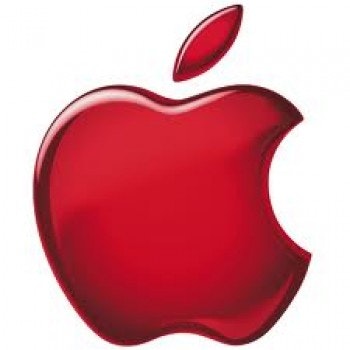When Apple Inc. (NASDAQ:AAPL) first conceived the iPhone, one concept was to use the cumbersome iPod click wheel as the central control of the phone. After using the touchscreen interface that Apple finally decided upon, that idea seems ludicrous. However, it does show how intertwined the iPod and the iPhone have long been.
When the iPhone was first launched, Steve Jobs stood in front of a sign that had three soon-to-be iconic buttons behind him: “iPod, Phone, Internet.” The inclusion of the iPod was just as important as an access point to holding a full-featured and easy-to-use Internet in your hand.

Digital music: Apple’s domain
Apple rode booming iPhone sales to more success in the digital-music world. While gaudy numbers about the billions of apps downloaded began to steal the show at Apple Inc. (NASDAQ:AAPL)’s presentations, its dominance of music continued expanding. Competition over digital-music sales has increased markedly in recent years, with Amazon.com, Inc. (NASDAQ:AMZN) aggressively pricing digital music and building out its cloud player. Likewise, after relying on third-party music services such as Amazon when Android first launched, Google Inc (NASDAQ:GOOG) unveiled Google Music in 2011 to better compete with iTunes as a central music hub.
Yet this increased investment in the digital-music space from competitors hasn’t done much to dent Apple’s dominance. Asymco’s Horace Dediu recently pegged Apple Inc. (NASDAQ:AAPL)’s iTunes as paying out $3.4 billion in digital payments to publishers in 2012 — 60% of industry totals. That’s consistent with past research from NPD, which has shown iTunes maintaing roughly 66% of U.S. digital sales.
With Android now controlling roughly 70% of worldwide smartphone sales, it’d be easy to conclude it’ll begin chipping away at Apple’s music dominance. Yet market-share figures don’t always tell the full tale. Apple Inc. (NASDAQ:AAPL)’s iOS has higher market share in countries like the United States, where legal digital-music sales are much higher. Not only that, but getting the right licensing to sell music globally is a time-consuming affair. Google Music launched as U.S.-only, finally moving to Europe just last November. Apple has a large head-start in setting up global music sales.
Not only that, but Apple Inc. (NASDAQ:AAPL) has a dominant grasp on peripherals such as sound bars and alarm clocks to turn smartphones into music systems. Walk into a Bose store, and you’ll find nearly every piece of audio equipment working in conjunction with an iPod or iPhone.
Music matters beyond music sales
While Apple probably collected roughly a billion in sales for its cut of iTunes music sales last year, that’s never been the value of the service to the company. Instead, the real value has been the value to the overall Apple platform. Users who have large music and media libraries centered on iTunes have a strong reason to stick with new Apple products, whether they be a tablet, phone, or MP3 player. The $4.3 billion in gross revenue Apple collected last year in music sales stacks up nicely against the $118 billion the company collected in iPad, iPhone, and iPod sales in fiscal 2012 alone.
This all matters because music is a key component of mobile-device usage. Research from NPD shows that 56% of smartphone users and 40% of tablet users listened to music on their devices. On smartphones, 39% of listeners play music on a daily basis.
A new battleground?
Competing with iTunes in the digital-download space is hard to do. While companies such as Amazon and Google have failed to break Apple’s grasp by attacking Apple in digital download and matching services, another opportunity in the next transformation of digital music could provide a new way to compete: streaming.
Streaming services are becoming increasingly popular. Most users might be familiar with Pandora and Spotify in the space because of their popularity in the United States, but the space is extremely competitive. A study by website PaidContent mid-last year found 73 digital music services in the United Kingdom alone.
Why is there so much competition? Well, user interest is shifting in this direction, and money has been quick to follow. A study by IFPI found that while download music sale units increased 12% last year, paying for subscription music services increased 44%.
Apple is assuredly tuned into this opportunity. The newest version of iOS has hidden radio buttons that appear to be part of Apple’s efforts to build a new Pandora-like service within iTunes. Yet it does seem behind in the space. While it tries working on the right approach to creating a Pandora-like experience, news recently broke that Google itself is working on a Spotify-like service that could launch this year.
Streaming music is the ultimate platform play
The interesting part of the streaming-music gold rush is that the economics of the industry are terrible. In fiscal 2009, Pandora had sales of $19.3 million and a loss of $32 million. Sales have since soared to $383 million across the past 12 months, but losses have remained at … $32 million.
The problem is that advertising revenue barely covers the content costs that streaming companies have to pay labels. Throw in necessary increases to pay more employees as companies grow and the infrastructure costs for streaming all that music, and costs scale almost directly with increasing sales.
In spite of efforts from the industry to move to more subscription services and decrease its music licensing and royalty fees, it’s a lousy business as it currently stands. Yet what these services lack in profitability, they make up for in influence. A recent Goldman Sachs Group, Inc. (NYSE:GS) study found 62% of iOS users ranked Pandora a top-three music service they listen to on their phones, versus 59% who ranked their iTunes library as a top-three service.
With Apple having gained so much over the past decade-plus of iTunes dominance, having third-party applications begin to take up more importance in users’ minds is clearly a threat to the company.
Enter Samsung?
So how could an Apple rival profit from these changing trends in music? I’d put forth that Samsung has the most to gain. Android fueled Samsung to 215.8 million smartphone shipments last year. The next-closest rival in the Android space was Huawei, which captured just 4.9% of the smartphone market in the fourth quarter. Samsung collected 29% of all smartphone sales.
Samsung’s dominance has been stunning, but there are a couple of troubling long-term threats to the company:
1. It’s hard to control a market with such dominance when you’re relying on a platform like Android that’s open for hundreds of handset vendors to use. So far, the company has used superior marketing spend and better product design to keep its lead. However, Samsung’s wariness over using Android is shown by its development of its own mobile operating system, Bada, and its recent leadership in another OS, Tizen.
2. Google’s fear that Android will become dominated by Samsung has recently been splashed across the news. The company is rightfully nervous that Samsung controls such much of the platform. This is especially troubling for Samsung, since Google owns its own hardware unit in Motorola that it could use to push out designs and wean Android off its Samsung reliance.
One way Samsung could try decreasing the first threat is to create some differentiation. For example, HTC has created its “Sense UI” to give it a different feel from other Android phones. Samsung has made its own Android changes, but there’s only so much change you can add to the stock Android experience.
Instead, a better use of Samsung’s money could be to invest in differentiation via the streaming-music trend. Consider that Pandora currently has a market value of $2.1 billion. Samsung could probably buy the company, even with a healthy premium for $3 billion. That would represent about 14% of the company’s profitability last year, and it has net cash of more than $21 billion in the bank to facilitate such a purchase.
The key idea would be that users gain tremendous value from streaming media, but the industry has lousy economics. Apple solved the puzzle by making music a complement to high-margin hardware sales. Samsung could do the same and in the process could further differentiate itself through having the most popular music-streaming platform in the United States. It’s a cagey move for a company with little potential on its own but huge potential as part of a platform.
A slam-dunk deal?
No such deal is imminent between Pandora and Samsung; this is purely my speculation on a deal that is extremely intriguing. It’s worth also noting that the complications of international copyright law means Pandora’s brand currently only holds value in the United States and has yet to expand internationally.
Yet the United States is also a market where Apple is strongest and Samsung could use more of a competitive edge. With the company paying out a whopping $12.2 billion in marketing expenses alone last year, Pandora’s recognition could be a huge edge in the marketing space. Eventually, the company could expand overseas if it chose to and fold Pandora into its Music Hub software.
Whether or not Samsung buys Pandora, this is a space where the standalone economics of start-ups pales in comparison with the value of being part of a larger platform. I’d expect to see some consolidation in the space this year, and it’ll be targeting Apple’s dominance over the music space.
The article 1 Acquisition Apple Doesn’t Want to See: Samsung Buying Pandora originally appeared on Fool.com and is written by Eric Bleeker, CFA.
Eric Bleeker, CFA, has no position in any stocks mentioned. The Motley Fool recommends and owns shares of Amazon.com, Apple, and Google.
Copyright © 1995 – 2013 The Motley Fool, LLC. All rights reserved. The Motley Fool has a disclosure policy.





